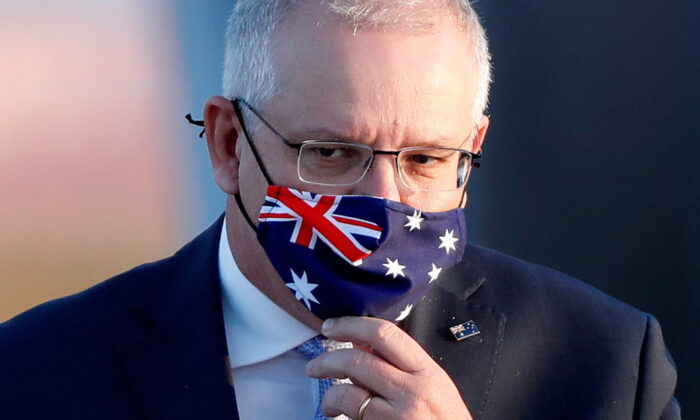Parler CEO Defends Free Speech: ‘It’s Not Against the Law to Have Those Opinions’
Prime Minister Scott Morrison has dismissed criticism from the communist regime in China after its embassy in Canberra deliberately leaked an unofficial document that outlined a list of grievances about some of Australia’s foreign policy positions.
“China is angry. If you make China the enemy, China will be the enemy,” an unnamed Chinese embassy official allegedly told a reporter during a briefing in Canberra on Tuesday, The Sydney Morning Herald (SMH)聽reported.
Morrison characterised the Chinese embassy’s unofficial document as the communist regime taking issue with Australia for speaking up on human rights abuses and taking umbrage with politicians and some media for speaking freely about the nature of the regime.
“We make our laws and our rules and pursue our relationships in our interests and we stand up with other countries, whether it be on human rights issues or things that are occurring around the world including in China,” Morrison told the Today show. “We will continue to do that in accordance with our values.”
He added, “Now, if that is the source of tensions between Australia and China well, I can assure you Australia will continue to be ourselves.”
Morrison also said that Australia makes its laws in accordance with its own interests and values and “not at the behest of any other nation whether that’s the United States or China or anyone else.” This refutes the embassy’s claim that Australia was “doing the bidding of the U.S.”
The Chinese embassy reportedly supplied certain Australian media with the leaked document of 14 grievances after Australia and Japan jointly announced the two nations had agreed to cooperate on issues impacting the Indo-Pacific region and the South China Sea.聽In response, China’s Foreign Ministry Spokesperson Zhao Lijian said that the communist regime “deplores” the statement released by the two nations.
Among the Chinese regime’s complaints were reportedly criticisms of Australia’s free press; comments made by parliamentarians about the Chinese Communist Party (CCP); the government’s call for an inquiry in the origins of COVID-19, the disease caused by the CCP virus; the government’s cooperation-building efforts with its Indo-Pacific partners; funding for thinktank the Australian Strategic Policy Institute; banning Huawei from the 5G network in 2018; foreign investment policies; and new foreign interference laws.
The Epoch Times has not seen the leaked document which was only released to The Sydney Morning Herald, The Age, and Nine News.
On Thursday, Treasurer Josh Frydenberg echoed the prime minister’s sentiments while speaking with Neil Mitchell on 3AW radio.
“Our national interests are non-negotiable,” Frydenberg said. Having said that, he also acknowledged that it was a “challenging time in terms of the relationship with China.”
The leaked document from the Chinese regime also reportedly accused the Morrison government of “attempting ‘to torpedo’ Victoria’s Belt and Road deal,” according to SMH.
When asked by 3AW’s Neil Mitchell whether the state of Victoria was wrong to be involved in the Belt and Road initiative, Frydenberg said, “We’ve never supported the Belt and Road and that’s been our position.”
“But it doesn’t matter whether it’s our free press or whether it’s the views of our parliamentarians or security institutes or foreign investment or Belt and Road; our positions are well known and we’re sticking to them,” he added.
Trade Minister Simon Birmingham is also聽standing firm, saying he doesn’t accept the accusation that Australia was “poisoning” bilateral relations.
“I’m not going to respond to nameless allegations that have been made by alleged officials,”聽he told the ABC on Thursday.
“We make no apologies for Australia having foreign investment laws that act in Australia’s national interest, for protecting communications networks,” he went on to say. “But on all of these things, we do it in a non-discriminatory way.”
But while both Birmingham and Frydenberg have said that Australia is willing to have mutually beneficial discussions with Chinese officials, the Chinese regime’s spokesperson Lijian indicated that the regime wants Australia to change its policies first.聽Australia says its phone calls continue to go unanswered by China.
Focus News: Australia Responds to ‘Nameless’ Threat From China
Pentagon Says It Shot Down Unarmed Missile in Sea-Based Test
